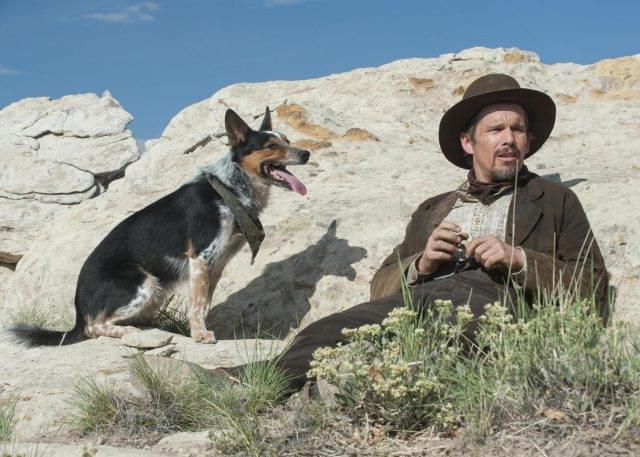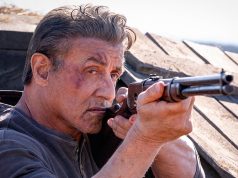
“I promised my dog I wasn’t going to kill anybody on this trip.” That’s a great thing for a gunman in a Western to growl at somebody who’s trying his patience, and Ethan Hawke growls it with aplomb in Ti West’s “In a Valley of Violence.” You won’t be disappointed to learn that he’s soon forced to break that pledge; you might, however, feel let down when you realize how basic the film’s plot is, and what a missed opportunity it is for a filmmaker with proven talent.
After six features in the horror genre (most notably “The House of the Devil” and “The Innkeepers”), Ti West has made a Ti Western — a widescreen, shot-on-film, honest-to-goodness Old West tale about a stranger who drifts into town and runs afoul of the locals. The town, a nearly deserted mining community in the late 19th century, is called Denton, and the stranger (played by Hawke) is Paul, an ex-cavalryman who has left killing Indians in search of a new line of work. His companion is a dog named Abbie, a loyal, lovable mongrel whose antics are a strong argument for all Westerns to feature dogs. (Sorry, horses. You’re great, too.)
Paul is just passing through on his way to Mexico when he’s harassed by Gilly (James Ransone), a mouthy deputy marshal who likes to pick fights and fancies himself an expert gunslinger. Gilly is backed by a trio of dusty, giggling goons; by his shrieking fiancee (Karen Gillan), who runs the town’s hotel with her sister; and by the fact that his father is the marshal. Dad, played by John Travolta at 75% ham level (i.e., slightly lower than usual), knows his son is a troublemaking idiot, but what’s a father to do?
Thus ensues a semi-satisfying revenge drama that could have been a real corker if it weren’t woefully predictable and under-developed. West (who also scripted and edited) found heroes in cinematographer Eric Robbins and composer Jeff Grace, whose photography and music give the film the grandeur and respectability of the finest Westerns. The central performances, too, are fierce, often funny, and full of life.
It’s the screenplay that comes up short. Westerns have a long tradition of being un-complex, but this one seems bent on avoiding all depth, subtext, and meaning. Paul is haunted by his past, but all we really get out of it is a few lines like “I’m not a good man. Not anymore.” The marshal has a wooden leg and is said to be running Denton (a town of about a dozen people) unfairly, but there’s no discussion of it. Paul attracts the interest of the hotelier’s younger sister (Taissa Farmiga), who’s already had a hard life at 16, but little is made of her backstory, either.
Finally, all of the violence in the movie is instigated not by philosophical differences or conflicting agendas but by simple, dumb pridefulness — yet West doesn’t even make a point about THAT, about how tragedy can arise from such small aggressions, or about the futility of revenge, or any of the other themes one might find in this scenario. This shallowness is a disservice to the film’s many excellent ingredients. That dog deserves better!
B- (1 hr., 44 min.; )





